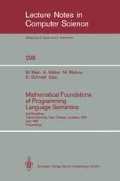Abstract
In this paper we investigate a model construction recently described by Jean Yves Girard. This model differs from the models of McCracken, Scott, etc. in that the types are interpreted (quite pleasingly) as domains rather than closures or finitary projections on a universal domain. Our objective in this paper is two-fold. First, we would like to generalize Girard's construction to a larger category called dI-domains which was introduced by Berry [2]. The dI-domains possess many of the virtues of the domains used by Girard. Moreover, the dI-domains are closed under the separated sum and lifting operators from denotational semantics and this is not true of the domains of Girard. We intend to demonstrate that our generalized construction can be used to do denotational semantics in the ordinary way, but with the added feature of type polymorphism with a “types as domains” interpretation. Our second objective is to show how Girard's construction (and our generalization) can be done abstractly. We also give a representational description of our own construction using the notion of a prime event structure.
Preview
Unable to display preview. Download preview PDF.
References
Amadio, R., Bruce, K. B., Longo, G., The finitary projection model for second order lambda calculus and solutions to higher order domain equations. In: Logic in Computer Science, edited by A. Meyer, IEEE Computer Society Press, 1986, pp. 122–130.
Berry, G., Stable models of typed λ-calculi. In: Fifth International Colloquium on Automata, Languages and Programs, Springer-Verlag, Lecture Notes in Computer Science, vol. 62, 1978, pp. 72–89.
Bruce, K. and Meyer, A., The semantics of polymorphic lambda-calculus. In: Semantics of Data Types, edited by G. Kahn, D.B. MacQueen and G. Plotkin, Lecture Notes in Computer Science, vol. 173, Springer-Verlag, 1984, pp. 131–144.
Coquand, T., and Ehrhard, T., An equational presentation of higher-order logic. To appear in: Category theory and computer science, Lecture Notes in Computer Science, Springer-Verlag, 1987.
Coquand, T., Gunter, C., and Winskel, G., Domain theoretic models of polymorphism. In preparation. To appear as: University of Cambridge Computer Laboratory Technical Report, 1987.
Girard, J. Y., Interprétation fonctionelle et élimination des coupures de l'arithmétique d'ordre supérieur. Thèse d'Etat, Université Paris VII, 1972.
Girard, J. Y., The system F of variable types, fifteen years later. Theoretical Computer Science, vol. 45, 1986.
Gunter, C. A., Universal profinite domains. Information and Computing, vol. 72 (1987), pp. 1–30.
Kahn, G., and Plotkin, G., Domaines concrets. Rapport IRIA Laboria, no. 336, 1978.
McCracken, N., An Investigation of a Programming Language with a Polymorphic Type Structure, Doctoral Dissertation, Syracuse University, 1979.
Nielsen, M., Plotkin, G., Winskel, G., Petri nets, event structures and domains. Theoretical Computer Science, vol. 13, 1981.
Fairbairn, J., Design and implementation of a simple typed language based on the lambda-calculus. University of Cambridge Computer Laboratory Technical Report, no. 75, 1985, 107pp.
Reynolds, J. C., Polymorphism is not set-theoretic. In: Semantics of Data Types, edited by G. Kahn, D.B. MacQueen and G. Plotkin, Lecture Notes in Computer Science, vol. 173, Springer-Verlag, 1984, pp. 145–156.
Reynolds, J. C., Towards a theory of type structures. In: Colloque sur la Programmation, Springer-Verlag, Lecture Notes in Computer Science 19, 1974, pp. 408–425.
Scott, D. S., Some ordered sets in computer science. In: Ordered Sets, edited by I. Rival., D. Reidel Publishing Company, 1981, pp. 677–718.
Seely, R., Categorical semantics for higher order polymorphic lambda calculus. Manuscript, 1986, 33pp.
Smyth, M. B. and Plotkin, G. D. The category-theoretic solution of recursive domain equations. SIAM Journal of Computing, vol. 11 (1982), pp. 761–783.
Winskel, G., Events in Computation. Doctoral Dissertation, University of Edinburgh, 1980.
Winskel, G., A representation of completely distributive algebraic lattices. Report CS-83-154 of the Computer Science Department, Carnegie-Mellon University, 1983.
Winskel, G., Event structures. University of Cambridge Computer Laboratory Technical Report, no. 95, 1986, 69pp.
Author information
Authors and Affiliations
Editor information
Rights and permissions
Copyright information
© 1988 Springer-Verlag Berlin Heidelberg
About this paper
Cite this paper
Coquand, T., Gunter, C., Winskel, G. (1988). dI-domains as a model of polymorphism. In: Main, M., Melton, A., Mislove, M., Schmidt, D. (eds) Mathematical Foundations of Programming Language Semantics. MFPS 1987. Lecture Notes in Computer Science, vol 298. Springer, Berlin, Heidelberg. https://doi.org/10.1007/3-540-19020-1_18
Download citation
DOI: https://doi.org/10.1007/3-540-19020-1_18
Published:
Publisher Name: Springer, Berlin, Heidelberg
Print ISBN: 978-3-540-19020-2
Online ISBN: 978-3-540-38920-0
eBook Packages: Springer Book Archive

